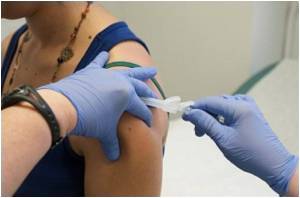A cell-culture–derived vaccine was as effective at preventing flu as conventional vaccines grown in chicken eggs, the preferred method for 50 years, according to a study.

Cell-based flu vaccines have major advantages over the traditional manufacturing process, including unlimited supply, a shorter production time, and an alternative for persons allergic to eggs.
They may also be better suited for developing a shield against the potential pandemic threat of a deadly H5N1 bird flu mutation.
But their effectiveness had yet to be fully tested in a large-scale clinical trial, according to the authors.
Noel Barrett, a researcher at the Biomedical Research Centre in Austria, and colleagues divided more than 7,000 volunteers in the United States, 18 to 49 years old, into two groups.
Participants in the first group were injected with a flu vaccine derived from lab-grown cells during the 2008-2009 influenza season, while the second group was given a placebo shot with no active ingredients.
Advertisement
There were no serious secondary effects, with only a few "mild and transient" problems registered.
Advertisement
Cell-based flu vaccines have been approved for use in Europe, and were made in limited quantities before and during the 14-month World Health Organisation (WHO) H1N1 "swine flu" pandemic alert in 2009/2010.
The virus turned out to be less lethal than feared, and large stocks of hastily manufactured vaccine went unused.
But had the flu been more deadly -- especially early in the flu season -- it is unlikely that pharmaceutical companies could have kept up with demand using the egg-based method of fabrication, experts say.
In egg culture, flu viruses are injected into chicken egg embryos, where they multiply. After several days of incubation a machine opens the egg and harvests the virus, which is then purified and chemically killed.
On average it takes one or two eggs to produce a single dose of annual flu vaccine.
In cell culture, the virus is grown in animal or human cells, which are available in unlimited supply.
In August 2010, the WHO said swine flu -- which has to date claimed more than 18,400 lives worldwide -- had "largely run its course", declaring an end to the pandemic.
The H1N1 virus is now regarded as part of seasonal influenza and protection is included in standard seasonal flu vaccines.
Source-AFP











